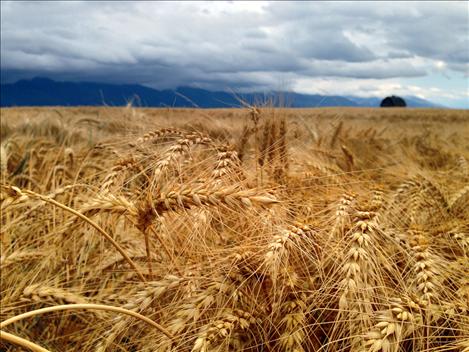To GMO or not to GMO? Farmers face tough decisions
Hey savvy news reader! Thanks for choosing local.
You are now reading
1 of 3 free articles.
LAKE COUNTY — Local farmers could face tough decisions about planting wheat or transitioning to hardier genetically modified crops.
With approximately 80 percent of Montana’s wheat exported to countries in south Asia, the economic impact of Japan’s wheat embargo — triggered by an unintended release of genetically modified wheat, and lifted in July — could have been devastating. Yet for Montana farmers, it was minimal.
“We actually had very little impact because Montana doesn’t grow the soft white wheat embargoed,” said Steve Becker, outreach coordinator for the Montana Wheat and Barley Committee.
Still, farmers have to be vigilant of the genetically modified seeds that caused the embargo.
“It is something we will watch,” Becker said. “Japan is our biggest buyer and at this time Japan is set on ‘No GMO wheat.’”
Japan is one of many countries to politicize and ban crops that are genetically modified by scientists to be resistant to pesticides and pests, of greater nutritional value, or have other qualities that help increase yield. Critics argue the crops aren’t natural, might cause negative health effects and contribute to increased use of pesticides.
More than 60 varieties of genetically modified crops have been approved by the USDA since 1996. The majority of corn, soybeans, and cotton planted in the U.S. come from the engineered seeds.
But there was no genetically modified wheat in the United States, largely due to market opposition, until May. That’s when an Oregon farmer found a patch of herbicide-resistant crop engineered by agribusiness giant Monsanto.
Investigators have been unable to determine how the strain of wheat that was engineered in a test group many years ago ended up in the field, although Canadian officials have speculated geese might have carried the seeds southward.
That GMO wheat crop was all it took for Japan to pull the plug on U.S. wheat imports.
Japan’s adamant stance on GMO crops could put it on a collision course with farmers in Montana and other western states where it is becoming more profitable for farmers to grow genetically modified corn, said Lola Raska, executive vice president for the Montana Grain Grower’s Association.
“We’re losing wheat acres because farmers are trying other GMO crops that don’t die as easily,” Raska said. “It hasn’t affected Montana so much that it’s noticeable yet, but we are seeing competition. We have customers in every corner of the state trying new things.”
Raska predicts the issue will come to a head in the next six or seven years in Montana.
Scott Johnson, feed plant manager at Westland Seed in Ronan, said he doesn’t think the wheat embargo has driven local farmers to reconsider their planting habits.
“Nobody has come into our store and said ‘because of the GMO release accident I want to plant something different,’” Johnson said.
He said farmers are always considering ways to add crops, especially ones modified to be resistant to weeds that are a problem in the Mission Valley.
“A good crop rotation helps increase yields,” Johnson said. “Are there new crops that we’re looking for? Of course. Are some of those genetically altered? Yes.”
Johnson said the benefits of increased yields often are a major determining factor of what to grow.
“We are trying to feed the world,” Johnson said. “I always say that it’s easy to complain about GMOs when you’ve got a full belly. Wait until you are hungry and then see what you think about GMOs.”
Johnson said the market will ultimately decide which crops are grown and which are not.
“When GMO wheat comes it will be a very popular crop,” Johnson said. “There will always be a market for conventionally grown crops, too. There’s a market for everything. The market will determine whether GMOs are acceptable or not.”
















